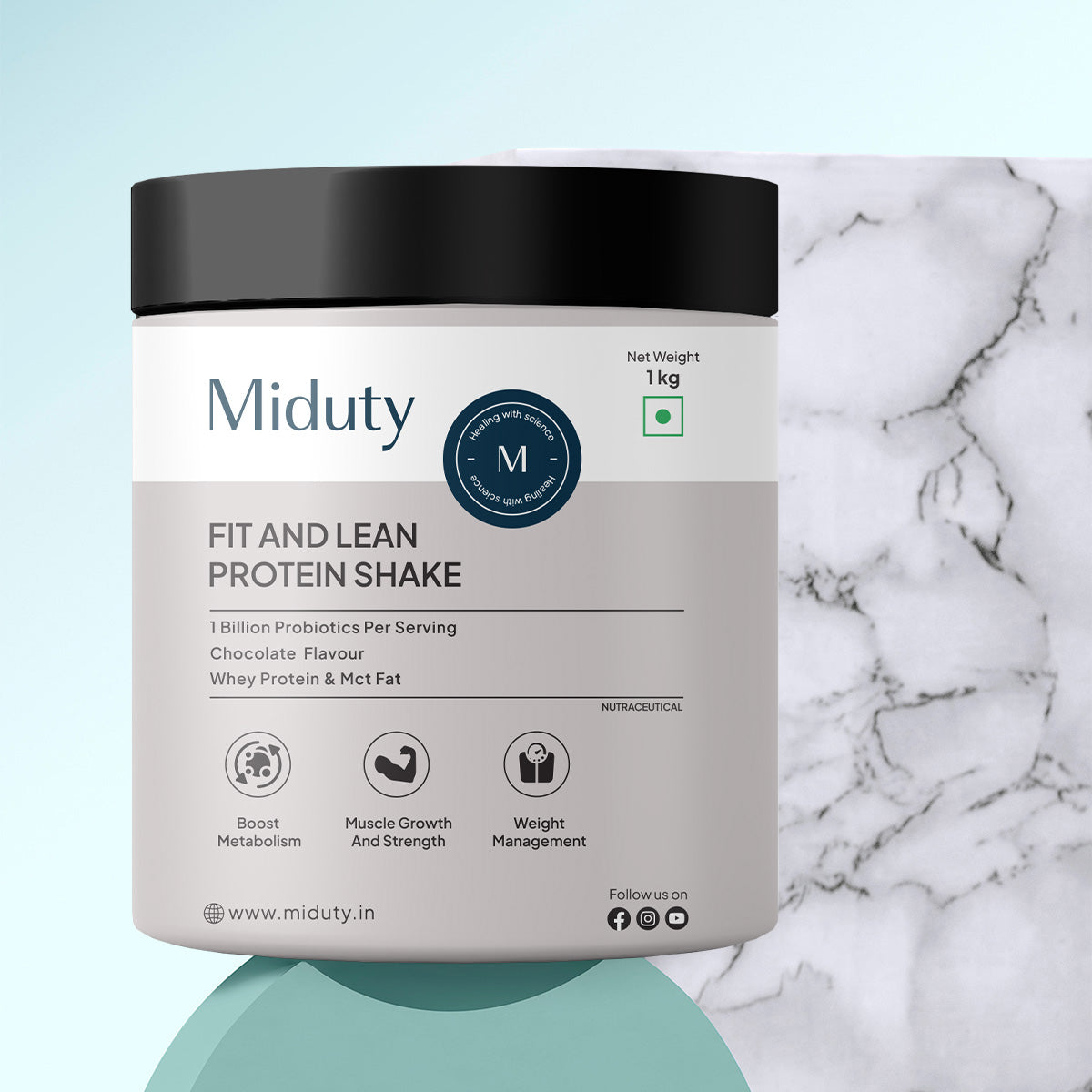
Thyroid and Weight: How Thyroid Hormones Affect Weight
Key Takeaways:
1️. Thyroid Hormones Drive Metabolism: T3 levels account for 60.1% of the variation in basal metabolic rate (BMR), showing just how much your thyroid controls calorie burning at rest.
2. Hypothyroidism & Weight Gain: Up to 5% of the population is affected by hypothyroidism, often causing slow metabolism, fat accumulation, and water retention.
3️. Hyperthyroidism & Weight Loss: Overactive thyroid speeds up metabolism, leading to unintentional weight loss, muscle breakdown, and decreased strength.
4. Thyroid Affects Fat & Carb Metabolism: Low thyroid function slows fat breakdown, raises cholesterol, and alters carbohydrate metabolism, contributing to weight changes.
5️. Lifestyle & Supplements Support Thyroid Health: Nutrients like iodine, selenium, zinc, and 600 mg/day ashwagandha for 8 weeks have been shown to raise T3 by 41.5%, T4 by 19.6%, and lower TSH by 17.4% in subclinical hypothyroid patients.
Have you ever wondered why some people can eat large amounts of food without gaining a pound, while others seem to gain weight just by looking at dessert? It happens due to your thyroid gland. This small, butterfly-shaped organ regulates how your body uses energy, making it one of the most crucial controllers of metabolism and weight.
When your thyroid hormones are in balance, your metabolism runs smoothly, burning calories efficiently. But when they're off even slightly, you may experience sudden weight gain or unexplained weight loss, fatigue, and changes in mood or appetite.
Let's know how the thyroid influences weight control, the connection between thyroid disorders and metabolism, and practical ways to manage both your thyroid health and body weight effectively.
What is the Thyroid Gland?
The thyroid gland is a small, butterfly-shaped organ that works under the direction of the brain, specifically the hypothalamus and pituitary gland. The hypothalamus releases Thyrotropin-Releasing Hormone (TRH), which tells the pituitary to release Thyroid-Stimulating Hormone (TSH). In turn, TSH prompts the thyroid to produce its two main hormones: triiodothyronine (T3) and thyroxine (T4).
These hormones travel through the bloodstream, influencing metabolism, temperature regulation, heart rate, and even brain function. The thyroid also interacts with other hormones, such as insulin, estrogen, and cortisol, creating a delicate hormonal balance that affects your overall well-being.
Types of Thyroid Hormones and Their Roles
The two main thyroid hormones, T3 and T4, play distinct yet interconnected roles in energy balance.
1. Thyroxine (T4): The thyroid produces mostly T4, a relatively inactive form of thyroid hormone. It acts as a reservoir, ready to be converted into the active form, T3, when needed.
2. Triiodothyronine (T3): T3 is the active form of the hormone that regulates metabolic processes in every cell of the body. It increases the rate at which cells use oxygen and energy.
The conversion of T4 to T3 mainly happens in the liver, kidneys, and muscles. This conversion process is crucial because if it's impaired due to stress, nutrient deficiency, or illness, your metabolism can slow down even if your thyroid gland appears normal.
How Thyroid Hormones Influence Weight and Metabolism?
1. Metabolism Control
Thyroid hormones determine your basal metabolic rate (BMR); the number of calories your body burns while at rest. T3 levels account for 60.1% of the variation in basal metabolic rate (BMR). [1]
- When thyroid hormones are low (hypothyroidism), metabolism slows down, causing weight gain.
- When they are high (hyperthyroidism), metabolism speeds up, leading to weight loss.
2. Fat & Carb Metabolism
Thyroid hormones also affect how your body metabolizes fats and carbohydrates. T3 and T4 regulate how your body stores fat and burns it for energy. In hypothyroidism, fat breakdown slows, and the body tends to store more fat, especially around the abdomen. They stimulate the breakdown of fat (lipolysis), promote glucose production, and regulate cholesterol levels. When thyroid function is impaired, fat breakdown slows, and cholesterol levels rise.
3. Water Retention
People with hypothyroidism often experience fluid retention, adding a few extra kilos that are not actually fat but water weight due to hormonal imbalance.
4. Appetite and Digestion
Thyroid hormones influence appetite-regulating hormones like leptin and ghrelin. Low thyroid levels can cause sluggish digestion and constipation, making you feel bloated and heavy.
How Thyroid Disorders Affect Weight Gain and Weight Loss?
Hypothyroidism affects up to 5% of the general population, with a further estimated 5% being undiagnosed. Over 99% of affected patients suffer from primary hypothyroidism. Worldwide, environmental iodine deficiency is the most common cause of all thyroid disorders, including hypothyroidism, but in areas of iodine sufficiency, Hashimoto's disease (chronic autoimmune thyroiditis) is the most common cause of thyroid failure. [2]
1. Hypothyroidism and Weight Gain
Hypothyroidism, or an underactive thyroid, is one of the most common thyroid disorders and a frequent cause of unexplained weight gain. When your thyroid gland fails to produce enough thyroid hormones, particularly T3 and T4, your metabolism slows down, meaning your body burns fewer calories at rest. This leads to gradual weight gain. It is more common in women and can often go unnoticed for years.
The weight gained from hypothyroidism comes from the retention of salt and water due to slower kidney function and reduced elimination of excess fluids. However, the sluggish metabolism also encourages fat accumulation, especially around the abdomen and hips.
2. Hyperthyroidism and Weight Loss
Hyperthyroidism, or an overactive thyroid gland, where the gland produces excessive thyroid hormones. This condition accelerates metabolism, causing the body to burn calories at an unusually rapid pace even during rest. As a result, individuals with hyperthyroidism often experience unintentional and sometimes dramatic weight loss, despite maintaining or even increasing food intake.
The excess thyroid hormones increase heart rate, body temperature, and overall energy expenditure. However, this accelerated metabolism also leads to muscle breakdown, as the body begins to use muscle proteins for energy when calorie needs exceed intake. Consequently, people with hyperthyroidism may look thinner but weaker, with decreased muscle mass and strength.
In overweight adults, those with higher starting levels of free T3 and free T4 lost more weight in the first 6 months (about 3.9-5.9 kg), but these hormone levels didn't affect weight gain later. Changes in these hormones were also connected to metabolism, body fat, and other health markers. [3] [4]
5 Ways to Support Thyroid Health and Manage Your Weight
1. Eat a Balanced, Thyroid-Friendly Diet
- Iodine: Essential for thyroid hormone production. Found in iodized salt, seaweed, and fish.
- Selenium: Supports hormone activation. Found in Brazil nuts, eggs, and sunflower seeds. [5]
- Zinc: Helps convert T4 to active T3. Found in pumpkin seeds, chickpeas, and whole grains.
- Avoid goitrogens (in excess): Found in raw cruciferous vegetables like cabbage, broccoli, and cauliflower; cooking them reduces their thyroid-inhibiting effects.
- Protein-rich foods: Adequate protein supports hormone synthesis and metabolism. Include eggs, lean meats, and legumes, and a protein supplement may prove beneficial, too.
2. Prioritize Regular Exercise
Exercise boosts metabolism and supports hormone balance.
- For hypothyroidism: Try low-impact workouts like brisk walking, yoga, and swimming.
- For hyperthyroidism: Focus on gentle forms like yoga or meditation to reduce stress and regulate energy levels.
3. Manage Stress
Chronic stress can disrupt the hypothalamic-pituitary-thyroid (HPT) axis, worsening thyroid imbalance. Practices like deep breathing, meditation, and adequate sleep can help keep cortisol levels (the stress hormone) in check.
4. Reduce toxin exposure:
Environmental toxins, especially heavy metals and endocrine disruptors (like BPA), can harm the thyroid. Opt for glass containers, organic produce, and natural cleaning products.
5. Thyroid-supporting supplements:
Adding a combination of zinc, selenium, sea kelp, and ashwagandha alongside your regular diet can further support healthy thyroid function and hormone balance. 600 mg/day ashwagandha for 8 weeks raised T3 by 41.5%, T4 by 19.6%, and lowered TSH by 17.4% in subclinical hypothyroid patients. [6] [7]
Conclusion:
The thyroid gland might be small, but its impact on your overall health and weight is enormous. Acting as the body's metabolic control center, it dictates how efficiently you burn calories, how much energy you have, and even how you feel daily. When thyroid hormone levels are balanced, weight management feels effortless. But when they're off, it can lead to fatigue, mood swings, and stubborn weight changes that seem impossible to control.
Whether you're dealing with hypothyroidism, hyperthyroidism, or simply trying to support a healthy thyroid, the key lies in balancing hormones, nutrition, stress, and lifestyle. Eating a nutrient-dense diet, managing stress levels, staying active, and taking proper thyroid-supporting supplements with medical care can help better thyroid health.
FAQ's on Thyroid and Weight
Q1. How to reverse thyroid weight gain?
You can reverse thyroid-related weight gain by balancing thyroid hormones through proper medication, eating a thyroid-supportive diet rich in iodine, selenium, and zinc, and staying active with regular exercise. Also, manage stress and get adequate sleep, as both play a key role in hormone balance and metabolism.
Q2. Can people with thyroid lose weight?
Yes, people with thyroid issues can lose weight, but it may take extra effort. Managing hormone levels through medication, a balanced diet, regular exercise, and stress control can help boost metabolism and support healthy weight loss.
Q3. Does high TSH cause weight gain?
Yes, high TSH levels usually indicate an underactive thyroid (hypothyroidism), which slows metabolism and leads to weight gain. This weight increase is often due to fat accumulation and water retention caused by a hormonal imbalance.
Q4. Can your thyroid make you gain weight?
Yes, an underactive thyroid can make you gain weight by slowing down your metabolism. When thyroid hormone levels drop, your body burns fewer calories, leading to fat and fluid accumulation.
Q5. How fast do you lose weight with thyroid?
Weight loss with thyroid issues varies depending on hormone balance, diet, and lifestyle. Once thyroid levels are normalized, gradual weight loss of 0.5-1 kg per week is typical with proper nutrition and exercise.
Q6. Does thyroid affect metabolism?
Yes, thyroid hormones are key regulators of metabolism. They control how quickly your body burns calories, processes fats and carbohydrates, and produces energy, directly influencing weight and overall energy levels.
Q7. Does higher TSH mean faster metabolism?
No, higher TSH usually indicates an underactive thyroid (hypothyroidism), which slows metabolism rather than speeds it up. Elevated TSH signals the thyroid isn't producing enough hormones, leading to slower calorie burning and potential weight gain.
References














